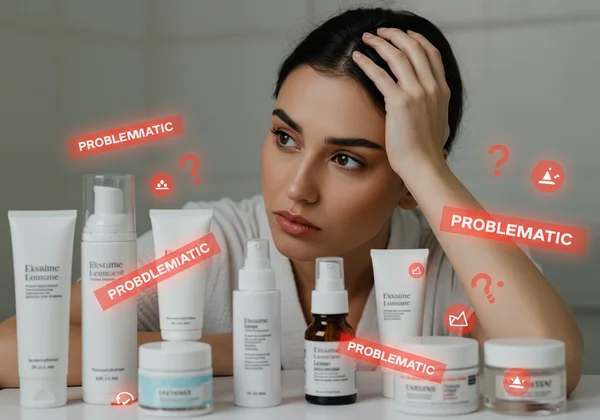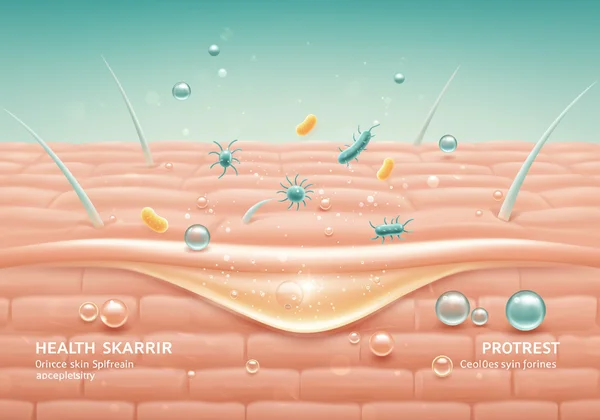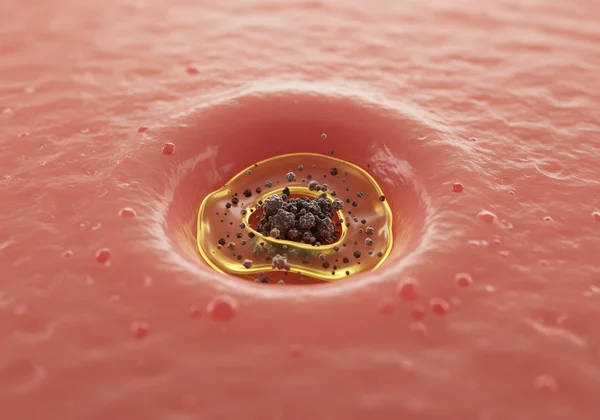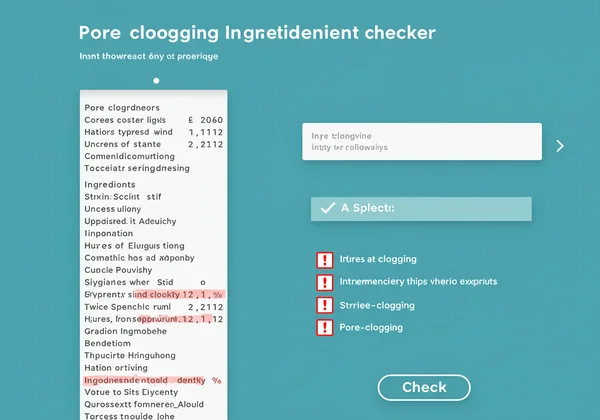Pore Clogging Ingredient Checker: Acne-Safe Moisturizer & Serum Guide
Struggling with breakouts, even when you're trying to hydrate? You're not alone. The path to clear skin often feels like a frustrating paradox, but the secret lies in understanding your product ingredients. This guide will equip you to find the perfect non-comedogenic moisturizer and acne-safe serum. But first, do you know what ingredients should I avoid for acne-prone skin?
Finding products that hydrate without causing congestion is the secret to a healthy, balanced complexion. It's not about avoiding moisture; it's about choosing the right moisture. By learning to identify potential culprits, you can finally build a routine that works with your skin, not against it. Ready to take control? You can start by using a skincare ingredient checker to get instant clarity on your current products.

Why Hydration is Crucial for Acne-Prone Skin
For years, the prevailing wisdom for treating acne was to dry it out with harsh cleansers and treatments. We now know that this approach is counterproductive. Proper hydration for acne is not just beneficial; it’s essential for healing breakouts and preventing new ones from forming.
Debunking the Myth: Drying Out Acne Does More Harm Than Good
When you strip your skin of its natural oils, it sends a panic signal to produce even more oil to compensate. This overproduction can lead to more clogged pores and more severe breakouts. Furthermore, dehydrated skin is compromised, making it more susceptible to irritation and inflammation, which only worsens the appearance of acne. A gentle, hydrating routine helps to regulate oil production over time.
Supporting Your Skin Barrier: The Key to Clearer Skin
Think of your skin barrier as a protective shield. When it's healthy and hydrated, it effectively keeps moisture in and harmful bacteria and irritants out. Harsh, drying products weaken this barrier, leaving your skin vulnerable and inflamed. A well-hydrated skin barrier functions optimally, helping your skin to heal faster from existing blemishes and become more resilient against future breakouts.

Identifying Pore-Clogging Moisturizer Ingredients
The term "moisturizer" can be intimidating when you have acne. The fear that a rich cream will immediately lead to pimples is valid, especially when so many products contain hidden pore clogging moisturizer ingredients. Understanding what to look for is your first line of defense.
What "Comedogenic" Really Means for Your Skin
An ingredient is considered comedogenic if it has a tendency to block pores, which can lead to the formation of comedones (blackheads and whiteheads). Ingredients are often rated on a comedogenic scale from 0 (non-comedogenic) to 5 (highly comedogenic). However, this scale is just a guideline. An ingredient's effect can vary based on your skin type, its concentration in the product, and the overall formulation.
Top Culprits: Common Pore-Cloggers to Avoid
While everyone's skin is unique, some ingredients are notoriously problematic for acne-prone individuals. Being able to spot these on an ingredient list is a powerful skill. Here are a few common offenders to watch out for:
- Coconut Oil: While popular in natural skincare, it has a high comedogenic rating (4 out of 5) and is a frequent cause of breakouts for many.
- Isopropyl Myristate: A synthetic oil used to give products a smooth, sheer feel, but it is highly comedogenic and can penetrate pores, causing irritation.
- Algae Extract: This sounds natural and harmless, but certain types can stimulate oil production and clog pores.
- Ethylhexyl Palmitate: Often used as a substitute for silicone, this ingredient can feel nice but is known to be comedogenic.
- Lauric Acid: A fatty acid that, despite having some antimicrobial properties, is known to be highly pore-clogging.
Navigating Ingredient Lists: Beyond the Buzzwords
Marketers love to use labels like "non-comedogenic" or "won't clog pores." Unfortunately, these terms are not regulated, and a product can still contain irritating ingredients. The only way to be certain is to analyze the full list of ingredients. This may seem daunting, but with the right help, it becomes second nature. You can analyze ingredients now to see how simple it can be.

Choosing Your Acne-Safe Serum & Hydrating Formulas
Now that you know what to avoid, let's focus on the good stuff. Selecting the right acne safe serum and moisturizer is about finding formulas packed with beneficial, non-comedogenic ingredients that support your skin's health.
Essential Non-Comedogenic Ingredients to Look For
Instead of living in fear of ingredients, get excited about finding ones that truly benefit your skin. Look for these heroes in your next hydrating product:
- Hyaluronic Acid: A powerful humectant that can hold 1,000 times its weight in water, providing intense hydration without being heavy or greasy.
- Glycerin: Another effective humectant that draws moisture into the skin, helping to keep it soft and supple.
- Niacinamide (Vitamin B3): A superstar ingredient that helps regulate oil production, reduces inflammation and redness, and improves skin barrier function.
- Squalane: A lightweight, non-greasy oil that mimics your skin's natural sebum, providing moisture without clogging pores. It's an excellent choice for all skin types, including oily and acne-prone.
- Ceramides: These are lipids that are naturally part of your skin barrier. Adding them back through skincare helps to fortify your skin's defenses.
Understanding Humectants, Emollients, and Occlusives for Acne-Prone Skin
Moisturizing ingredient types generally fall into three categories. For acne-prone skin, humectants are your best friend as they draw water into the skin. Emollients (like squalane) soften the skin but should be chosen carefully to ensure they aren't pore-clogging. Occlusives form a physical barrier to prevent water loss, but heavy occlusives like petroleum jelly can sometimes trap sebum and bacteria, so they should be used with caution.
Best Formulas: Gels, Lotions, and Creams for Your Skin Type
The texture and base of your moisturizer matter. Lightweight product formulas are typically the safest bet for acne-prone skin. Gel-based moisturizers are often oil-free and absorb quickly, making them ideal for very oily skin types. Lotions offer a bit more moisture than gels but are still generally lightweight. Don't rule out creams entirely; many modern formulas are designed to be non-comedogenic and can be great for those with dry yet acne-prone skin.
Empower Your Choice with a Pore Clogging Ingredient Checker
How can you possibly remember all this information while standing in a store aisle? You don't have to. Using a reliable pore clogging ingredient checker removes the guesswork and empowers you to make confident, informed decisions instantly.
Why Rely on an Unbiased Ingredient Analysis Tool?
An online tool offers an objective, scientific look at a product's formula, cutting through confusing marketing claims. This pore clogging checker provides an unbiased ingredient analysis based on a comprehensive, regularly updated database of known comedogenic ingredients. It’s a tool built on data, not brand partnerships, ensuring the results are always in your best interest. You can finally get an unbiased check and feel secure in your choices.
How Our Pore Clogging Checker Instantly Screens Your Products
The process is designed for simplicity and speed. You simply copy the full ingredient list from a product's website or packaging, paste it into the checker on our homepage, and click "Check." Within seconds, the tool cross-references the list with its database and highlights any potentially pore-clogging ingredients. This immediate feedback helps you identify red flags before you make a purchase, saving you from frustration and breakouts.

Take Control of Your Skincare Journey Today
Say goodbye to skincare guesswork. With the knowledge of key ingredients and the power of instant analysis, you can finally build a hydrating routine that clears, not clogs. Take control of your skin's health. Unveil hidden culprits and find your perfect products with our free Pore Clogging Checker today. Your journey to truly healthy, radiant skin starts here.
Frequently Asked Questions About Non-Comedogenic Products
How can I tell if my current moisturizer is pore-clogging?
The most reliable way is to check the full ingredient list. Labels can be misleading, but the ingredients don't lie. Simply copy and paste the list into a trusted comedogenic ingredient checker to get an instant analysis and identify any red-flag ingredients that could be contributing to your breakouts.
Are products labeled "non-comedogenic" always safe for acne-prone skin?
Not necessarily. The term "non-comedogenic" is not regulated by the FDA, so companies can use it without rigorous testing. A product might still contain one or two problematic ingredients or be formulated in a way that irritates your specific skin type. Always verify the full ingredient list yourself.
What type of hydration is best for very oily, acne-prone skin?
For very oily skin, look for oil-free, lightweight formulas like gels or gel-creams. These products are typically packed with humectants like hyaluronic acid and glycerin, which provide essential hydration without adding extra oil or weight to your skin. This helps balance oil production without causing congestion.
Can I use a pore-clogging ingredient checker on hair or body products?
Absolutely! Pore-clogging ingredients aren't limited to facial skincare. Shampoos, conditioners, and body lotions can contain oils and other ingredients that run down onto your face, chest, and back, causing breakouts. Using a tool like our hair product acne checker can help you find the source of stubborn body or hairline acne.
Disclaimer: This article is for informational purposes only and does not constitute medical advice. Please consult with a board-certified dermatologist for personalized skincare recommendations and treatment.